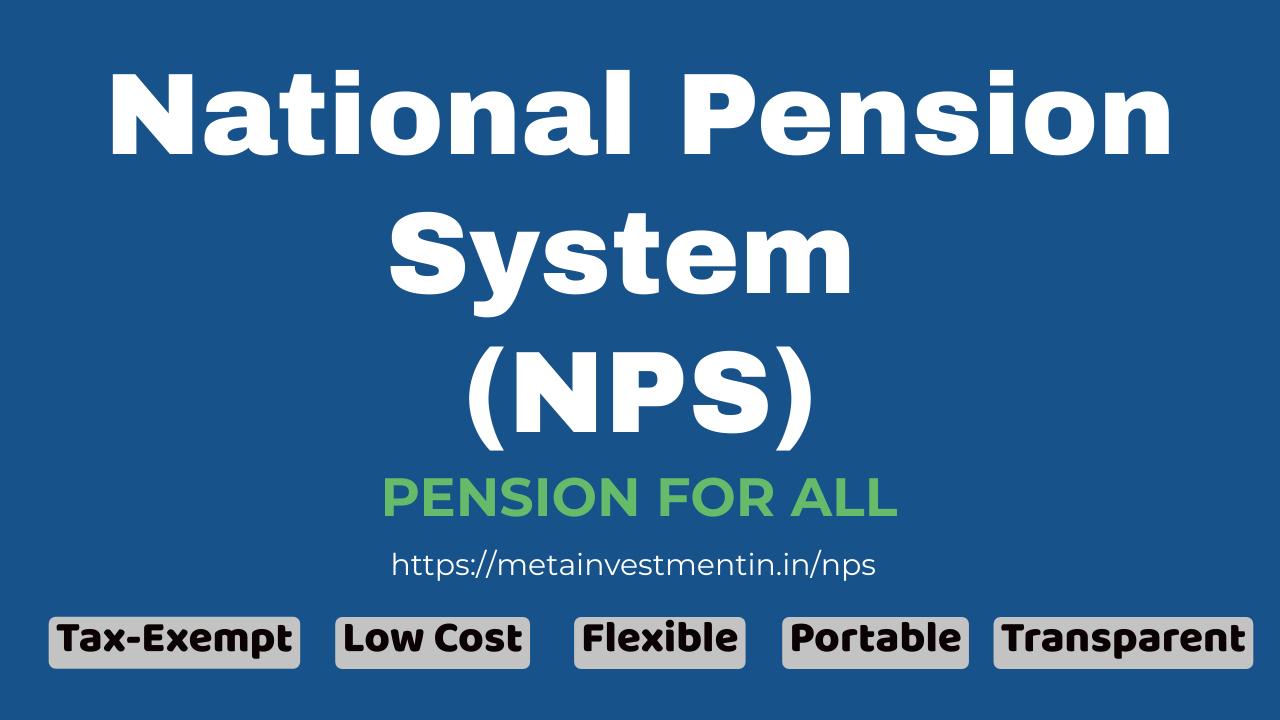 National Pension System (NPS), is the lowest cost and tax-efficient pension and investment system scheme available to all Indian citizens. Anyone working in the private sector, self-employed, Government employee (Central or State ) can join NPS. NPS provides an attractive long-term saving alternative with a secure and regulated market-based return for correctly planning your retirement. This scheme is regulated by The Pension Fund Regulatory and Development Authority (PFRDA) and it provides a secure but transparent platform. When a person reaches retirement age, they can withdraw a lump sum payout as well as regular income, allowing him/her to live a stress-free retirement.
National Pension System (NPS), is the lowest cost and tax-efficient pension and investment system scheme available to all Indian citizens. Anyone working in the private sector, self-employed, Government employee (Central or State ) can join NPS. NPS provides an attractive long-term saving alternative with a secure and regulated market-based return for correctly planning your retirement. This scheme is regulated by The Pension Fund Regulatory and Development Authority (PFRDA) and it provides a secure but transparent platform. When a person reaches retirement age, they can withdraw a lump sum payout as well as regular income, allowing him/her to live a stress-free retirement.
Open your NPS account under the All Citizen Model.
There are four models under NPS
- The Government Model
- The All Citizen Model
- The Corporate Model
- The Atal Pension Yojana
The Government Model
This model is primarily used for all Central Government employees (except armed forces).
The All Citizen Model
This model is available for all citizens of India. Any Indian citizen between ages of 18 to 70 can open his NPS account and invest money.
The Corporate Model
This model is available to entities registered under the Companies Act.
The Atal Pension Yojana (APY)
This was launched to provide defined pensions to the weaker sections of society, based on the contribution made and the period of contribution.
We at Meta Investment can help you in setting up your NPS account and plan for your retirement.
Why should I invest in NPS?
- Tax Saving
- When you invest ₹2 lakh, you can save up to ₹62,400 in taxes each year and receive a tax-free amount at maturity when you reach the age of 60.
- Cost-Effective
- A low-cost investment with a larger return. Although the initial investment may be little, the greater compounding aspect of these plans allows an individual to earn significant profits at retirement.
- Disciplined Investment
- Until you reach the age of 60, your investment is locked in. A minimum annual investment of Rs.1,000 is mandatory.
- Returns are guaranteed
- These programs provide better yields than other investments such as PPFs and FDs. The percentage of NPS invested in equities, on the other hand, may not provide guaranteed returns.
- Lifetime source of income
- Inflation is having a negative influence on every part of our life. So, in order to continue your previous lifestyle, you’ll need a steady source of money. NPS provides that choice in the form of a pension throughout the duration of your retirement, making it a lifesaver at a time when you most need financial assistance.
- Professionally managed
- Your funds are invested and managed by the top pension fund managers in India.
Types of NPS accounts
There are two types of NPS accounts: Tier I and Tier II.
Tier I
Tier I accounts are required for NPS investments, and all tax-saving benefits apply to this account category. It is, however, a limited and conditional withdrawable retirement account that may only be withdrawn if the NPS departure requirements are met.
Tier II
Tier-II accounts are optional and are accessible to any Tier-1 account user as an add-on. Subscribers can take their money out of this account whenever they like, but there are no tax advantages to investing in a Tier II account
Various Tax Deductions under NPS for Tier 1 Account
Rs.1,50,000 as per section 80CCD(1)(section 80C) The deduction which may be claimed has to be minimum of 10% of gross income (in case of a self-employed taxpayer) or 10% of salary (in case of the taxpayer being an employee) or Rs.1,50,000.
Rs.50,000 as per section 80CCD(1b) (budget 2015 offers additional tax benefit under section 80CCD of the Income Tax Act,1961). Investors can, therefore, avail of (maximum) a tax benefit of Rs. 2 lakhs.
10% of basic salary + dearness allowance as per section 80CCD(2) An employer’s contribution can be shown as deduction under section 36 I (IV) from business income. The minimum deduction claimed should not be above 10% of the salary while there is no limit in terms of the maximum amount. The deduction applicable as per section 80CCD(2) is, therefore, over and above Rs.1,50,000 as per section 80C and 80CCD(1).









